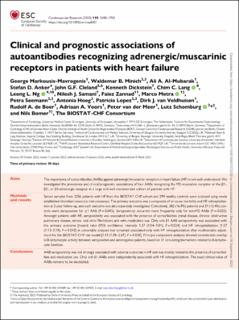| dc.contributor.author | Markousis-Mavrogenis, George | |
| dc.contributor.author | Minich, Waldemar B. | |
| dc.contributor.author | Al-Mubarak, Ali A. | |
| dc.contributor.author | Anker, Stefan D. | |
| dc.contributor.author | Cleland, John G. F. | |
| dc.contributor.author | dickstein, kenneth | |
| dc.contributor.author | Lang, Chim C. | |
| dc.contributor.author | Ng, Leong L. | |
| dc.contributor.author | Samani, Nilesh J. | |
| dc.contributor.author | Zannad, Faiez | |
| dc.contributor.author | Metra, Marco | |
| dc.contributor.author | Seemann, Petra | |
| dc.contributor.author | Hoeg, Antonia | |
| dc.contributor.author | Lopez, Patricio | |
| dc.contributor.author | Van Veldhuisen, Dirk J. | |
| dc.contributor.author | De Boer, Rudolf A. | |
| dc.contributor.author | Voors, Adriaan A. | |
| dc.contributor.author | Van Der Meer, Peter | |
| dc.contributor.author | Schomburg, Lutz | |
| dc.contributor.author | Bomer, Nils | |
| dc.date.accessioned | 2023-09-14T13:06:05Z | |
| dc.date.available | 2023-09-14T13:06:05Z | |
| dc.date.created | 2023-09-05T14:27:41Z | |
| dc.date.issued | 2023 | |
| dc.identifier.issn | 0008-6363 | |
| dc.identifier.uri | https://hdl.handle.net/11250/3089522 | |
| dc.description.abstract | Aims
The importance of autoantibodies (AABs) against adrenergic/muscarinic receptors in heart failure (HF) is not well-understood. We investigated the prevalence and clinical/prognostic associations of four AABs recognizing the M2-muscarinic receptor or the β1-, β2-, or β3-adrenergic receptor in a large and well-characterized cohort of patients with HF.
Methods and results
Serum samples from 2256 patients with HF from the BIOSTAT-CHF cohort and 299 healthy controls were analysed using newly established chemiluminescence immunoassays. The primary outcome was a composite of all-cause mortality and HF rehospitalization at 2-year follow-up, and each outcome was also separately investigated. Collectively, 382 (16.9%) patients and 37 (12.4%) controls were seropositive for ≥1 AAB (P = 0.045). Seropositivity occurred more frequently only for anti-M2 AABs (P = 0.025). Amongst patients with HF, seropositivity was associated with the presence of comorbidities (renal disease, chronic obstructive pulmonary disease, stroke, and atrial fibrillation) and with medication use. Only anti-β1 AAB seropositivity was associated with the primary outcome [hazard ratio (95% confidence interval): 1.37 (1.04–1.81), P = 0.024] and HF rehospitalization [1.57 (1.13–2.19), P = 0.010] in univariable analyses but remained associated only with HF rehospitalization after multivariable adjustment for the BIOSTAT-CHF risk model [1.47 (1.05–2.07), P = 0.030]. Principal component analyses showed considerable overlap in B-lymphocyte activity between seropositive and seronegative patients, based on 31 circulating biomarkers related to B-lymphocyte function.
Conclusions
AAB seropositivity was not strongly associated with adverse outcomes in HF and was mostly related to the presence of comorbidities and medication use. Only anti-β1 AABs were independently associated with HF rehospitalization. The exact clinical value of AABs remains to be elucidated. | en_US |
| dc.language.iso | eng | en_US |
| dc.publisher | Oxford University Press | en_US |
| dc.rights | Navngivelse 4.0 Internasjonal | * |
| dc.rights.uri | http://creativecommons.org/licenses/by/4.0/deed.no | * |
| dc.title | Clinical and prognostic associations of autoantibodies recognizing adrenergic/muscarinic receptors in patients with heart failure | en_US |
| dc.type | Journal article | en_US |
| dc.type | Peer reviewed | en_US |
| dc.description.version | publishedVersion | en_US |
| dc.rights.holder | Copyright 2023 The Author(s) | en_US |
| cristin.ispublished | true | |
| cristin.fulltext | original | |
| cristin.qualitycode | 2 | |
| dc.identifier.doi | 10.1093/cvr/cvad042 | |
| dc.identifier.cristin | 2172593 | |
| dc.source.journal | Cardiovascular Research (CVR) | en_US |
| dc.source.pagenumber | 1690-1705 | en_US |
| dc.identifier.citation | Cardiovascular Research (CVR). 2023, 119 (8), 1690-1705. | en_US |
| dc.source.volume | 119 | en_US |
| dc.source.issue | 8 | en_US |

